Diplomat: His Excellency Gilberto Fonseca-Guimarães de Moura
Words Maxmilian Wechsler
Words Maxmilian Wechsler
| AMBASSADOR Gilberto Fonseca-Guimarães de Moura joined the Brazilian Ministry of Foreign Affairs (Itamaraty) in 1975; he was assigned to his first posting abroad, East Berlin, one year later. The ambassador has enjoyed a long and distinguished career in service of his country, and views his current posting in Bangkok as another opportunity to watch history unfold in an exciting cosmopolitan capital. He began his term here, as representative of the largest and most populous South American country, in July 2014. We met in the entrance of the ambassador’s three-story residence, which is lined with the Brazilian flag along with the flags of Cambodia, Laos and Thailand, the three countries under Mr de Moura’s jurisdiction. From the outset of the interview it was obvious that this very pleasant man has a tremendous knowledge of the world, people, and politics. Just as remarkable, he has a good sense of humour and a gift for putting people at ease. When told that the interview would be published in March he said: “Well, my 65th birthday is March 12, so the interview will be my birthday gift.” |
Background
“I was born in 1952 in Rio de Janeiro, at that time the capital of Brazil. The first capital was Salvador da Bahia, in the Northeast, and the current capital is Brasilia, in the middle of the country,” said the ambassador. “My father comes from the Northeast and my mother is from Rio; her ancestry is Portuguese. My childhood was spent in Rio and that’s where I was educated. I sat for examinations at the Brazilian Diplomatic Academy – the Rio Branco Institute (in honour of the Baron of Rio Branco, patron of the Brazilian Diplomacy), graduating with the class of 1975. That was the last year of the academy’s residence in Rio, having thereafter moved to the planned capital city of Brasilia.
“I joined Itamaraty because since I was a child I always wanted to be a diplomat. I never had second thoughts. Maybe I was influenced by my grandfathers. My grandfather on my mother’s side was a businessman who lived in England for many years; my grandfather on my father’s side was a criminal lawyer and a sugar-cane farmer owner, who introduced me to history and politics.”
“When I was perhaps ten years old, I created an imaginary country of which I was Prime Minister. I gave the country a name and was caught up by the fantasy. My father even designed a map for my imaginary country, and I wrote its history. I decided the official language of my imaginary country was German. Don’t ask me why, but it’s interesting that my first posting was in what was then the German Democratic Republic (GDR), also known as East Germany. I started as third secretary at the embassy there. Bangkok now is my second ambassadorial post. The first was in Ljubljana, Slovenia, where I served before coming here.”
Brasilia
The ambassador explained that Brazil was first colonised by the Portuguese; Brazilian cities grew up along the coast of the Atlantic Ocean. Since the 19th Century, Brazilian authorities sought to secure and develop the ‘sertões’, the vast inner lands of Brazil, very little inhabited. There was a feeling that it would be better to move the capital further inland. But it was not until 1960 that the President of Brazil, Juscelino Kubitschek, who was of Czech origin, took the final decision to transfer the capital to Brasilia.
“He was a brave man. It took a lot of courage to do that. There were two major personalities involved in the building of Brasilia. The first was President Kubitscheck, and the other was the famous architect Oscar Niemeyer. Together with the urban planner Lucio Costa, he designed the new capital, including the buildings of the National Congress, the Presidential Palaces, the Cathedral, the National Theatre, and the various ministries and other structures.
Brasilia has the shape of an airplane. In the middle, you have all the official buildings, and on the north and south are the ‘wings’ where the people live. There is a major lake surrounded by houses. It is quite an interesting city. It sits about 1,200 metres above sea level, which is a bit high, so the temperature is very pleasant. In the daytime it doesn’t get too hot, and in the evening it’s always cool.
“At first, people in government didn’t want to move to Brasilia because Rio is such a nice place. We have Copacabana and Ipanema beaches and it’s such a charming city. But the decision was made and the whole government and all ministries made the move. The last ministry to go was Itamaraty, and this was
partly due to resistance from some foreign embassies in Rio. Once the Brazilian MFA moved to Brasilia all embassies had to follow, and this happened in and around 1972. By then, the entire infrastructure was in place.
“My father was an architect and he was involved in the process of building Brasilia. He was a contemporary of Mr Niemeyer and of all the people who designed the new city. As a young architect, he saw it as a beautiful new world. He was passionate about Brasilia and I share his passion.”
“I was born in 1952 in Rio de Janeiro, at that time the capital of Brazil. The first capital was Salvador da Bahia, in the Northeast, and the current capital is Brasilia, in the middle of the country,” said the ambassador. “My father comes from the Northeast and my mother is from Rio; her ancestry is Portuguese. My childhood was spent in Rio and that’s where I was educated. I sat for examinations at the Brazilian Diplomatic Academy – the Rio Branco Institute (in honour of the Baron of Rio Branco, patron of the Brazilian Diplomacy), graduating with the class of 1975. That was the last year of the academy’s residence in Rio, having thereafter moved to the planned capital city of Brasilia.
“I joined Itamaraty because since I was a child I always wanted to be a diplomat. I never had second thoughts. Maybe I was influenced by my grandfathers. My grandfather on my mother’s side was a businessman who lived in England for many years; my grandfather on my father’s side was a criminal lawyer and a sugar-cane farmer owner, who introduced me to history and politics.”
“When I was perhaps ten years old, I created an imaginary country of which I was Prime Minister. I gave the country a name and was caught up by the fantasy. My father even designed a map for my imaginary country, and I wrote its history. I decided the official language of my imaginary country was German. Don’t ask me why, but it’s interesting that my first posting was in what was then the German Democratic Republic (GDR), also known as East Germany. I started as third secretary at the embassy there. Bangkok now is my second ambassadorial post. The first was in Ljubljana, Slovenia, where I served before coming here.”
Brasilia
The ambassador explained that Brazil was first colonised by the Portuguese; Brazilian cities grew up along the coast of the Atlantic Ocean. Since the 19th Century, Brazilian authorities sought to secure and develop the ‘sertões’, the vast inner lands of Brazil, very little inhabited. There was a feeling that it would be better to move the capital further inland. But it was not until 1960 that the President of Brazil, Juscelino Kubitschek, who was of Czech origin, took the final decision to transfer the capital to Brasilia.
“He was a brave man. It took a lot of courage to do that. There were two major personalities involved in the building of Brasilia. The first was President Kubitscheck, and the other was the famous architect Oscar Niemeyer. Together with the urban planner Lucio Costa, he designed the new capital, including the buildings of the National Congress, the Presidential Palaces, the Cathedral, the National Theatre, and the various ministries and other structures.
Brasilia has the shape of an airplane. In the middle, you have all the official buildings, and on the north and south are the ‘wings’ where the people live. There is a major lake surrounded by houses. It is quite an interesting city. It sits about 1,200 metres above sea level, which is a bit high, so the temperature is very pleasant. In the daytime it doesn’t get too hot, and in the evening it’s always cool.
“At first, people in government didn’t want to move to Brasilia because Rio is such a nice place. We have Copacabana and Ipanema beaches and it’s such a charming city. But the decision was made and the whole government and all ministries made the move. The last ministry to go was Itamaraty, and this was
partly due to resistance from some foreign embassies in Rio. Once the Brazilian MFA moved to Brasilia all embassies had to follow, and this happened in and around 1972. By then, the entire infrastructure was in place.
“My father was an architect and he was involved in the process of building Brasilia. He was a contemporary of Mr Niemeyer and of all the people who designed the new city. As a young architect, he saw it as a beautiful new world. He was passionate about Brasilia and I share his passion.”
| Assignment in GDR “My first post outside Brazil was to East Berlin. It was cold in the winter and very dark. It was a major contrast for a Brazilian who likes the sun and the beaches. It could have been very depressing, but you know, I really liked it there. It was a very special time. For me it was like coming back to history. When I saw the Brandenburg Gate for the first time I was very impressed. The east side is the most beautiful part of Berlin. It has the Opera House and the Pergamom Museum, the most beautiful structures in the then divided city. “I lived close to the Wall. I used to go to West Berlin very often, so I had to cross through the Walls’ checkpoints. I just flashed a special ID card. Most of the time I crossed in my car, which was a small Volkswagen Beetle. I got acquainted with all the guards and I would always say hello. They were always very nice to me. “I was then in my early 20s. Of course, when you are so young you are much more extrovert. You go out during the evening, you meet with friends. I have very good memories of this time. People say that your first posting is like your first love. You become attached to it. I was treated very well in the GDR and I met many well-known figures, like Erich Honecker, who was GDR’s leader, Fidel Castro, Muammar Gadhafi and others. “When the Brazilian ambassador left East Berlin I became Chargé d’ affairs for a while, so I had the chance to be present at many events where I could meet these people. It was a very interesting experience. “At that time, Brazil was under a military regime, and so were Chile and Argentina. Latin American governments in general were right-wing, so Communist East Germany was also a contrast in terms of politics. I met many people, young and old, in East Germany. I have to tell you, a lot of them, especially the older generation who had survived World War One and World War Two, felt that the socialist regime was more secure. The state was a major protector, and they had free education and medical care. They had their homes and employment guaranteed. The old Soviet regime was not, of course, any kind of model to aspire to, but it did provide a certain amount of social stability. | |
“However, the younger generation saw things differently. They wanted the benefits of capitalism. For example, for young East Germans pizza was a dream. I would buy pizza in West Berlin and bring it into East Berlin to eat with my friends.” The Ambassador, who besides East Germany had been stationed in Poland and Slovenia, said he had always felt ‘very comfortable’ in Central Europe.
“Before I was designated ambassador here I came once to Thailand due to a meeting in Indonesia. I was in charge of relations with some Asian countries and I had a stopover here. I believe this was in 2011. At the time the Brazilian Ambassador to Thailand was a very good friend of mine because we’d both been posted in Canada. So, I had a chance to stay in this very house over the weekend before going on to Indonesia.
“I couldn’t have imagined that just a couple of years later I would be living in this house. In comparison to other countries I have served, the climate in Thailand is great. This is the first time I have been posted to a tropical country. The weather in all my previous foreign posts Germany, Bolivia, France, Poland and Slovenia – was very different. In Bolivia I was in the capital, La Paz, which can be very cool because of the altitude (3,360 metres). I feel at home here, even though Rio is not quite as hot as Bangkok.
“Another thing I really like about Thailand is its extremely kind people. They are so delicate. I am very impressed by the respect shown to elders and foreigners, and the way Thais communicate their feelings. I really admire their behaviour and dignity and so many other qualities. When I go to Brazil and people ask what I like most in Thailand, I always say it is the Thai people.
“I also find the ways that Thai people cultivate and nourish their culture very beautiful. Thai people are rightly proud of their culture and this is reflected in their great respect for family. These are values that we now unfortunately seem to be losing in some Western countries.
“As far as working with Thai officials, the doors have always been open. To sum it all, it’s a real privilege to be here.
“The most moving moment I have experienced during my time here was the passing of His Majesty King Bhumibol Adulyadej. It is incredible to see the love and respect of the Thai people for their king and I’ve been very touched.”
The ambassador described a typical day: “I arrive at the embassy at 9am. To reach my office at Lumpini Tower on Rama IV Road from the residence in the morning takes about 30 minutes by car, although it’s just a little over one kilometer away. Traffic can get terrible and the small sois around my house are often blocked. Sometimes I leave the official car behind and walk or even take a motorcycle taxi to the office. When I take the car, I read the newspaper so by the time I arrive at the office I have an idea about current major events and of what is coming next.
“An important part of my job, of course, is to feed Itamaraty with good, up-to-date assessments of the overall climate in the country. The English-language newspapers available in Bangkok give good hints. We also nurture specialized press sources, local contacts and international primary sources, which includes other diplomats. Socialising is an important aspect of the job. But in this case, there is no free lunch nor dinner. We work in the morning, in the afternoon and especially in the evening. If you go to all these events, you will cultivate contacts.
“We also have locals who help us. If I am interested in finding more detail or clarification on some subject, they are a good source. I am very satisfied with the great degree of cooperation extended from the Thai MFA and its Department of American and South Pacific Affairs, which I am very involved with. One Thai gentleman I met there recently speaks very good Portuguese. In fact, there’s one diplomat at the Thai embassy in Brasilia who can speak perfect Portuguese. It’s still much more common to meet Thai people who can speak Spanish than Portuguese.”
Embassy, bilateral relations and exchanges
“We have five Brazilian full diplomats, including myself, five attachés coming from Brasilia and about 12 Thai staff, four of whom are fluent in Portuguese. The number of diplomats has increased and the number of activities we handle as well. Asia has become very important for Brazil and Thailand is a hub and a fundamental partner in Southeast Asia. I actively represent Brazil within the UN community headquartered in Bangkok, and to Laos and Cambodia.
“It is a lot of work and our embassy is starting to feel short-staffed. It is becoming small in the face of a great demand. We may have to move to another place or rent additional floor-space. In the meantime we are expanding to better fit the demands of the Consular Section. More Brazilians are coming to Thailand and more Thais are going to Brazil as well.
“The Brazilian embassy here doesn’t have a police or a resident military attaché so far. We have a military attaché based in Jakarta who covers Thailand and comes here often. But there has already been a political decision to install a permanent military attaché with residence in Bangkok. Concerning a Police Liaison, we don’t have at the moment enough cases that would justify its installation.
“Brazil and Thailand established diplomatic relations in 1959 and our respective embassies were opened soon afterwards. Relations between our two countries are harmonious and expanding. As I said before, the importance of Thailand and Southeast Asia in general is increasing. This is the opinion of my ministry and my own opinion as well. There is a lot of potential here and I can say very frankly that Brazil’s agenda is becoming bigger in areas like trade, economics and research. Interpersonal exchanges are increasing and I believe this is very healthy. There was a lot of interest in major events in Brazil like the FIFA World Cup and the Olympic and Paralympic Games, and a fair number of Thais made the trip to watch these events. Overall, though, tourism between our two countries still favours the other direction, by a factor of about ten to one.
“In the last few years the Brazilian middle class has expanded immensely. According to official figures, not long ago there were around 25,000 Brazilians coming to Thailand every year. This number jumped to 30,000, then 42,000, and now 55,000 to 60,000 Brazilians are coming yearly to Thailand. Brazilians can afford to spend more now and our people are more interested in traveling abroad. Before most would probably choose firstly the US and Europe, but now Brazilians are interested in experiencing different countries and regions. There are now many flights connecting Brazil to this part of the world. Normally you have a stopover in Doha, Istanbul, Dubai or Abu Dhabi. The flights are always crowded. Brazilians also like to visit Cambodia, Laos, Indonesian (Bali), and Singapore.”
The ambassador said Brazil’s exports to Thailand are mostly commodities like soya beans. “We import auto parts. Our car industry is a big business. The world’s largest chicken exporter, Brazilian BRF SA, recently bought Golden Foods Siam, a Thai company involved in the chicken business. Brazilians are very good in agro-business, so this kind of food chain is very attractive, and there are other areas that are attractive to Brazilian investors.
“We have in Thailand Brazilian business people, football players, teachers and also many models. The modelling industry is very important in Brazil. Last month the famous Brazilian social documentary photojournalist Sebastião Salgado presented his works here. Muay Thai is very popular in Brazil and many Brazilians are coming for classes. There was as a major Muay Thai event featuring Brazilian fighters in Bangkok on February 9.
“We have the Brazilian carnival in Bangkok every year in May. This is a major ball that takes place in top hotels, with people wearing carnival costumes and having a good time. We have bands coming from Brazil and from Japan, where many Brazilians live.
“Well-known Thai singer and hotel owner Khun Kamala Sukosol, who is very fond of Brazil, received the Itamaraty Cultural Award from the Brazilian government in September last year.
“There are about 500 Brazilian national livings in Bangkok. They have no obligation to register with the embassy but we encourage it. We can issue a small ID card to Brazilians who live here. It includes blood type information in case the holder has an accident.
“The Association of Brazil in Thailand and the Brazilian Citizens Council meet regularly here. The latter is a group of Brazilians in various sectors who represent the community and discuss many issues with us.
Personal
“It is a privilege, indeed, to be in Bangkok, a bustling, cosmopolitan regional hub. My socio-professional agenda is quite intense here and maintains me busy even on the weekends. In order to keep up with this dynamic rhythm I like to work out in the gym and swim in the residence’s pool. Whenever I can, I enjoy reading to also keep the spirit in shape. Although I am alone in Thailand, I have so many Thai friends that don’t let me get lonely. There is never a dull moment here in Bangkok!
“Bangkok also offers so much culinary experiences. I have been to many restaurants here, and I really like three or four of them. When Brazilian guests or officials come to my residence, I always try to offer them Thai food, but when I have Thai guests for dinner I offer them Brazilian food. I have here a Thai chef who is experienced in preparing Brazilian dishes from various parts of the country. We are big meat eaters.”
Mr de Moura isn’t sure of his next move after leaving Thailand or when that will be exactly. “I will have been here three years in July. The term of a Brazilian ambassador isn’t fixed, but generally it’s three to four years. The Brazilian law on retirement age is maybe about to change. Like almost everywhere else, the population of Brazil is aging. People don’t have as many children as before. They want to change the minimum age to 65 years. However, the compulsory retirement age in the Brazilian Foreign Service is 75.”
“Before I was designated ambassador here I came once to Thailand due to a meeting in Indonesia. I was in charge of relations with some Asian countries and I had a stopover here. I believe this was in 2011. At the time the Brazilian Ambassador to Thailand was a very good friend of mine because we’d both been posted in Canada. So, I had a chance to stay in this very house over the weekend before going on to Indonesia.
“I couldn’t have imagined that just a couple of years later I would be living in this house. In comparison to other countries I have served, the climate in Thailand is great. This is the first time I have been posted to a tropical country. The weather in all my previous foreign posts Germany, Bolivia, France, Poland and Slovenia – was very different. In Bolivia I was in the capital, La Paz, which can be very cool because of the altitude (3,360 metres). I feel at home here, even though Rio is not quite as hot as Bangkok.
“Another thing I really like about Thailand is its extremely kind people. They are so delicate. I am very impressed by the respect shown to elders and foreigners, and the way Thais communicate their feelings. I really admire their behaviour and dignity and so many other qualities. When I go to Brazil and people ask what I like most in Thailand, I always say it is the Thai people.
“I also find the ways that Thai people cultivate and nourish their culture very beautiful. Thai people are rightly proud of their culture and this is reflected in their great respect for family. These are values that we now unfortunately seem to be losing in some Western countries.
“As far as working with Thai officials, the doors have always been open. To sum it all, it’s a real privilege to be here.
“The most moving moment I have experienced during my time here was the passing of His Majesty King Bhumibol Adulyadej. It is incredible to see the love and respect of the Thai people for their king and I’ve been very touched.”
The ambassador described a typical day: “I arrive at the embassy at 9am. To reach my office at Lumpini Tower on Rama IV Road from the residence in the morning takes about 30 minutes by car, although it’s just a little over one kilometer away. Traffic can get terrible and the small sois around my house are often blocked. Sometimes I leave the official car behind and walk or even take a motorcycle taxi to the office. When I take the car, I read the newspaper so by the time I arrive at the office I have an idea about current major events and of what is coming next.
“An important part of my job, of course, is to feed Itamaraty with good, up-to-date assessments of the overall climate in the country. The English-language newspapers available in Bangkok give good hints. We also nurture specialized press sources, local contacts and international primary sources, which includes other diplomats. Socialising is an important aspect of the job. But in this case, there is no free lunch nor dinner. We work in the morning, in the afternoon and especially in the evening. If you go to all these events, you will cultivate contacts.
“We also have locals who help us. If I am interested in finding more detail or clarification on some subject, they are a good source. I am very satisfied with the great degree of cooperation extended from the Thai MFA and its Department of American and South Pacific Affairs, which I am very involved with. One Thai gentleman I met there recently speaks very good Portuguese. In fact, there’s one diplomat at the Thai embassy in Brasilia who can speak perfect Portuguese. It’s still much more common to meet Thai people who can speak Spanish than Portuguese.”
Embassy, bilateral relations and exchanges
“We have five Brazilian full diplomats, including myself, five attachés coming from Brasilia and about 12 Thai staff, four of whom are fluent in Portuguese. The number of diplomats has increased and the number of activities we handle as well. Asia has become very important for Brazil and Thailand is a hub and a fundamental partner in Southeast Asia. I actively represent Brazil within the UN community headquartered in Bangkok, and to Laos and Cambodia.
“It is a lot of work and our embassy is starting to feel short-staffed. It is becoming small in the face of a great demand. We may have to move to another place or rent additional floor-space. In the meantime we are expanding to better fit the demands of the Consular Section. More Brazilians are coming to Thailand and more Thais are going to Brazil as well.
“The Brazilian embassy here doesn’t have a police or a resident military attaché so far. We have a military attaché based in Jakarta who covers Thailand and comes here often. But there has already been a political decision to install a permanent military attaché with residence in Bangkok. Concerning a Police Liaison, we don’t have at the moment enough cases that would justify its installation.
“Brazil and Thailand established diplomatic relations in 1959 and our respective embassies were opened soon afterwards. Relations between our two countries are harmonious and expanding. As I said before, the importance of Thailand and Southeast Asia in general is increasing. This is the opinion of my ministry and my own opinion as well. There is a lot of potential here and I can say very frankly that Brazil’s agenda is becoming bigger in areas like trade, economics and research. Interpersonal exchanges are increasing and I believe this is very healthy. There was a lot of interest in major events in Brazil like the FIFA World Cup and the Olympic and Paralympic Games, and a fair number of Thais made the trip to watch these events. Overall, though, tourism between our two countries still favours the other direction, by a factor of about ten to one.
“In the last few years the Brazilian middle class has expanded immensely. According to official figures, not long ago there were around 25,000 Brazilians coming to Thailand every year. This number jumped to 30,000, then 42,000, and now 55,000 to 60,000 Brazilians are coming yearly to Thailand. Brazilians can afford to spend more now and our people are more interested in traveling abroad. Before most would probably choose firstly the US and Europe, but now Brazilians are interested in experiencing different countries and regions. There are now many flights connecting Brazil to this part of the world. Normally you have a stopover in Doha, Istanbul, Dubai or Abu Dhabi. The flights are always crowded. Brazilians also like to visit Cambodia, Laos, Indonesian (Bali), and Singapore.”
The ambassador said Brazil’s exports to Thailand are mostly commodities like soya beans. “We import auto parts. Our car industry is a big business. The world’s largest chicken exporter, Brazilian BRF SA, recently bought Golden Foods Siam, a Thai company involved in the chicken business. Brazilians are very good in agro-business, so this kind of food chain is very attractive, and there are other areas that are attractive to Brazilian investors.
“We have in Thailand Brazilian business people, football players, teachers and also many models. The modelling industry is very important in Brazil. Last month the famous Brazilian social documentary photojournalist Sebastião Salgado presented his works here. Muay Thai is very popular in Brazil and many Brazilians are coming for classes. There was as a major Muay Thai event featuring Brazilian fighters in Bangkok on February 9.
“We have the Brazilian carnival in Bangkok every year in May. This is a major ball that takes place in top hotels, with people wearing carnival costumes and having a good time. We have bands coming from Brazil and from Japan, where many Brazilians live.
“Well-known Thai singer and hotel owner Khun Kamala Sukosol, who is very fond of Brazil, received the Itamaraty Cultural Award from the Brazilian government in September last year.
“There are about 500 Brazilian national livings in Bangkok. They have no obligation to register with the embassy but we encourage it. We can issue a small ID card to Brazilians who live here. It includes blood type information in case the holder has an accident.
“The Association of Brazil in Thailand and the Brazilian Citizens Council meet regularly here. The latter is a group of Brazilians in various sectors who represent the community and discuss many issues with us.
Personal
“It is a privilege, indeed, to be in Bangkok, a bustling, cosmopolitan regional hub. My socio-professional agenda is quite intense here and maintains me busy even on the weekends. In order to keep up with this dynamic rhythm I like to work out in the gym and swim in the residence’s pool. Whenever I can, I enjoy reading to also keep the spirit in shape. Although I am alone in Thailand, I have so many Thai friends that don’t let me get lonely. There is never a dull moment here in Bangkok!
“Bangkok also offers so much culinary experiences. I have been to many restaurants here, and I really like three or four of them. When Brazilian guests or officials come to my residence, I always try to offer them Thai food, but when I have Thai guests for dinner I offer them Brazilian food. I have here a Thai chef who is experienced in preparing Brazilian dishes from various parts of the country. We are big meat eaters.”
Mr de Moura isn’t sure of his next move after leaving Thailand or when that will be exactly. “I will have been here three years in July. The term of a Brazilian ambassador isn’t fixed, but generally it’s three to four years. The Brazilian law on retirement age is maybe about to change. Like almost everywhere else, the population of Brazil is aging. People don’t have as many children as before. They want to change the minimum age to 65 years. However, the compulsory retirement age in the Brazilian Foreign Service is 75.”
|
BACKGROUND OF AMBASSADOR de MOURA
Education · Graduated in Law (Rio de Janeiro’s Pontifical Catholic University and in History (University Center of Brasília) · Admitted to the Brazilian Diplomatic Academy (Instituto Rio Branco); thesis defended on post-communist Poland and its relations to Brazil in the Advanced Studies of the Brazilian Diplomatic Academy Career · 1975: Started career in the Brazilian Foreign Service (Itamaraty) · 1975-1976: Assistant to the Chief of the African Division · 1976-1980: Third Secretary, Berlin (former German Democratic Republic) · 1980-1983: Second Secretary, Ottawa, Canada · 1983-1985: First Secretary, La Paz, Bolivia · 1985-1987: Chief of the Human Resources Division · 1987-1992: Executive Coordinator of the Foreign Service Department · 1992-1996: Counsellor, Paris, France · 1996-1998: Counsellor, Warsaw, Poland · 1998-2000: Chief of the American States Organization’s Division and Acting Director-General of the International |
Organizations
· 2000-2003: MinisterCounsellor, Deputy Permanent Representative, Brazilian Permanent Delegation to the UNESCO
· 2003-2007: Minister-Counsellor, Berlin
· 2007-2010: General-Coordinator for ASA (Africa and South America Summit), ASPA (South America and Arab countries Summit) and IBSA (Dialogue Forum for India, Brazil and South Africa)
· 2010: Director of Asia and Oceania Department
· 2011-2012: Director, Department of Inter-regional Mechanisms
· 2012-2014: Ambassador to Slovenia
Awards
· Brazilian Air Force Merit Medal: Santos Dumont
· Pro Eclesia et Pontificia Cross of the Holy See
· Grand Order of Rio Branco
· Brazilian Air Force Merit Medal: Grand Official
· 2000-2003: MinisterCounsellor, Deputy Permanent Representative, Brazilian Permanent Delegation to the UNESCO
· 2003-2007: Minister-Counsellor, Berlin
· 2007-2010: General-Coordinator for ASA (Africa and South America Summit), ASPA (South America and Arab countries Summit) and IBSA (Dialogue Forum for India, Brazil and South Africa)
· 2010: Director of Asia and Oceania Department
· 2011-2012: Director, Department of Inter-regional Mechanisms
· 2012-2014: Ambassador to Slovenia
Awards
· Brazilian Air Force Merit Medal: Santos Dumont
· Pro Eclesia et Pontificia Cross of the Holy See
· Grand Order of Rio Branco
· Brazilian Air Force Merit Medal: Grand Official

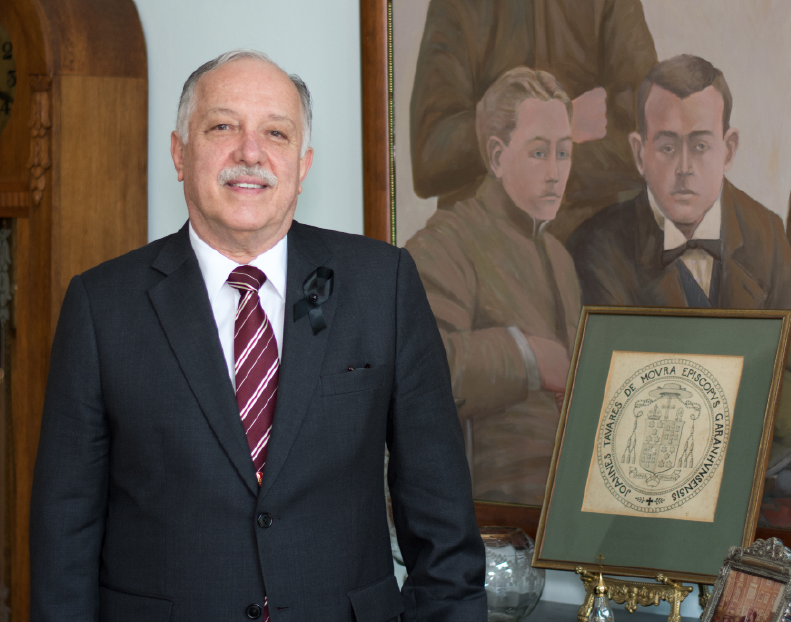
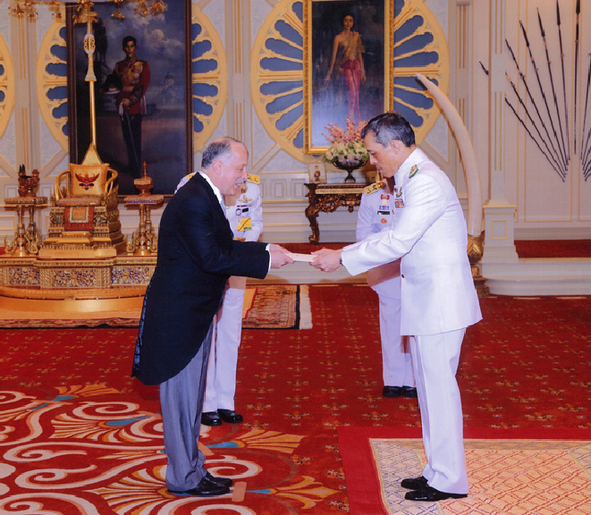
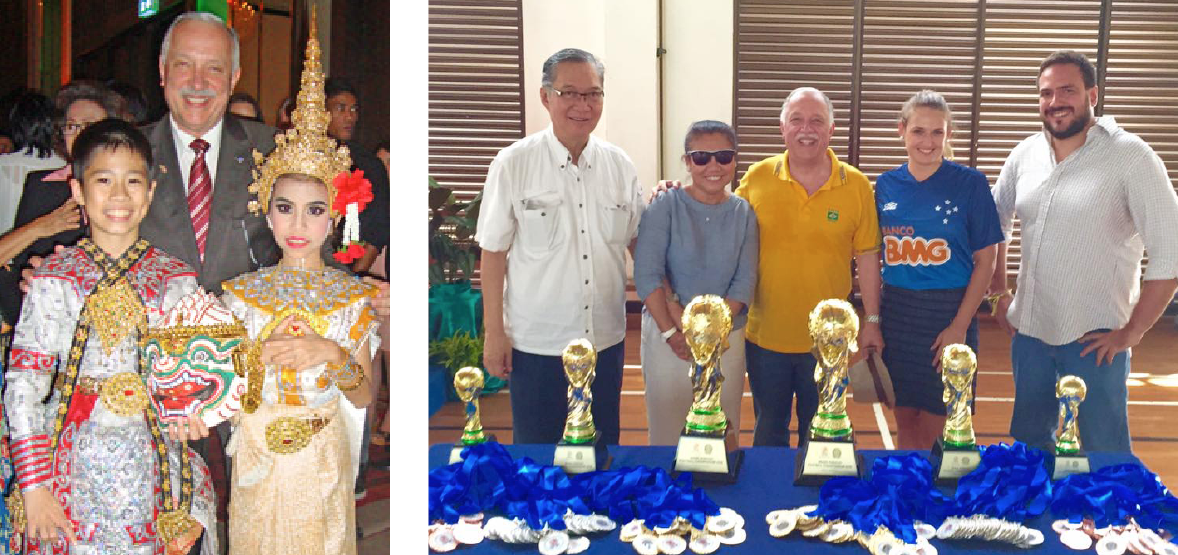
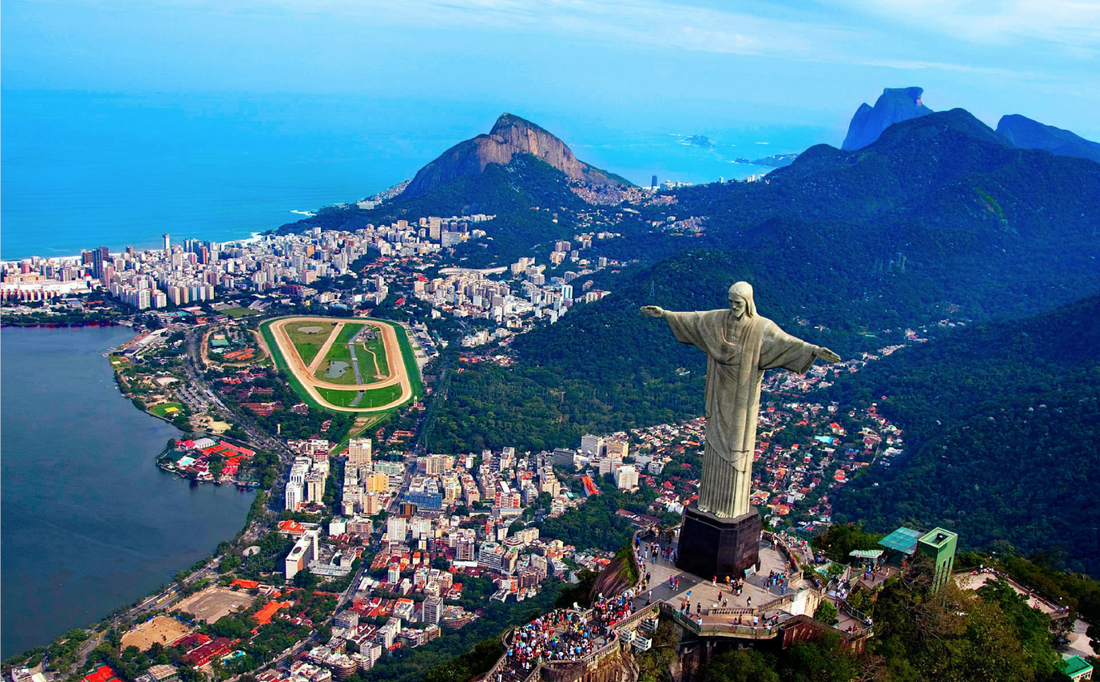
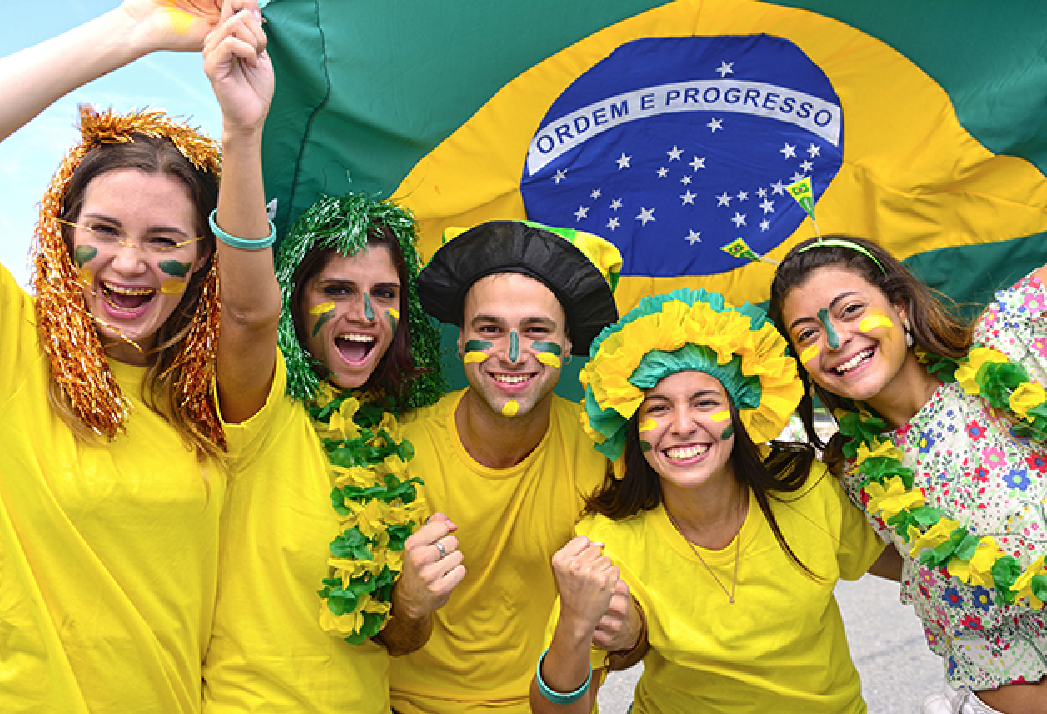
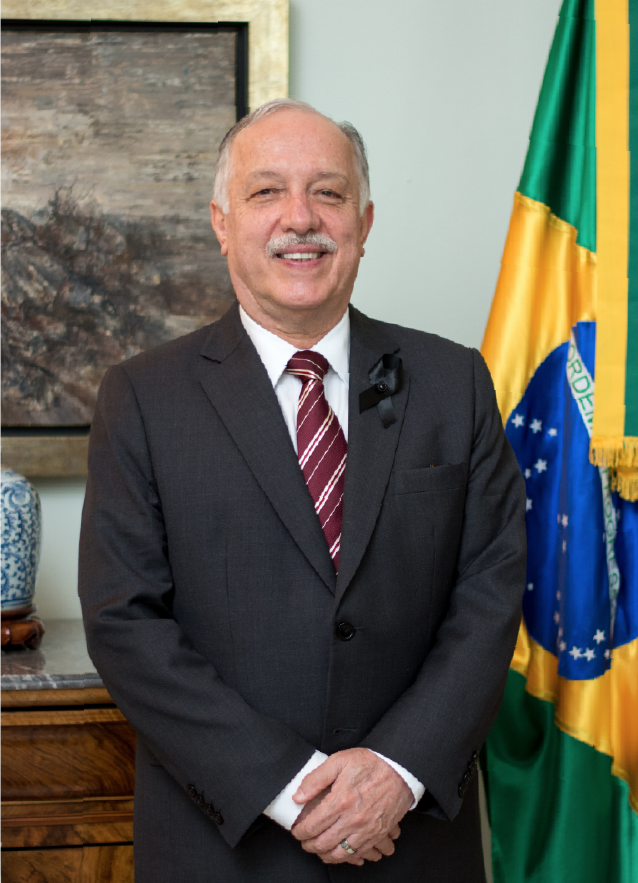
 RSS Feed
RSS Feed
















